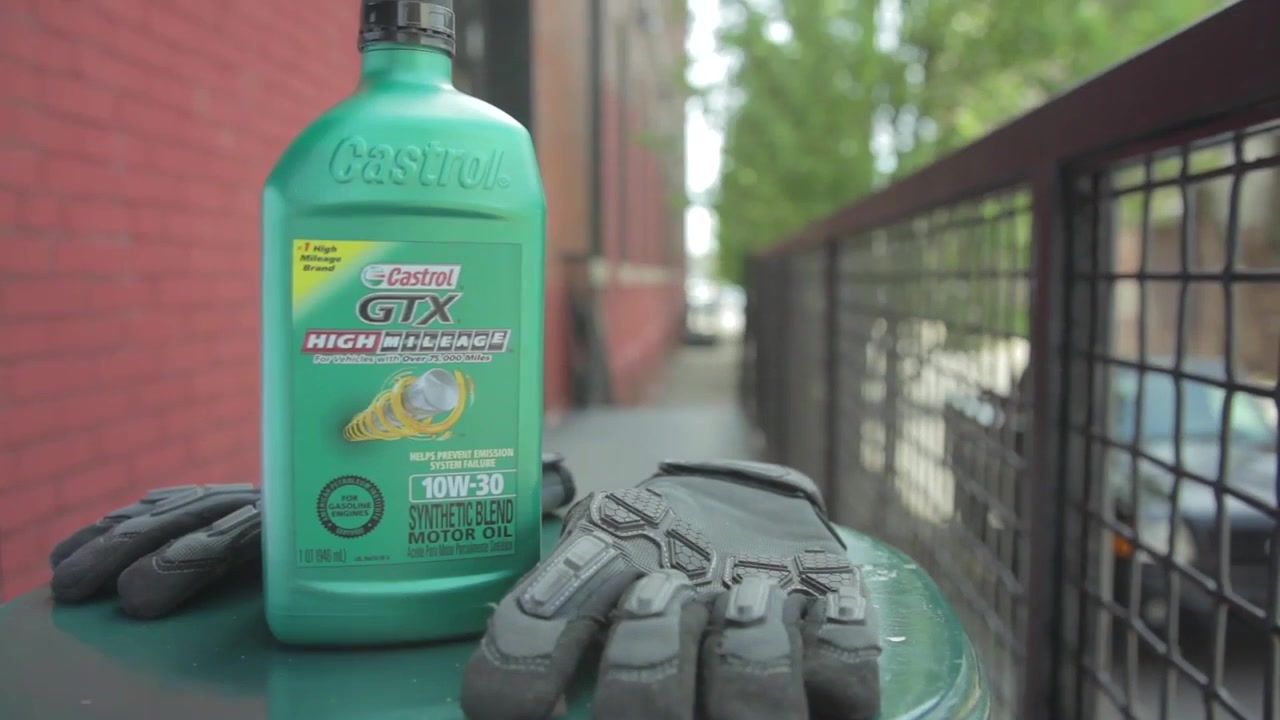What is High Mileage Oil & Is it Right for Your Car?

We’re gonna assume that you don’t spend your free time thinking about motor oil.
Yet still, you’ve probably found yourself in a Canadian Tire aisle, staring at shelves full of differently-sized bottles each with differently-coloured labels.
If you can relate to this, you’ll agree how important motor oil is for your car and why you need to pay attention to it. After all, if you choose the right motor oil, it will help your engine, but choose the wrong one and it will cause damage.
Your choice of motor oil matters even more important if you’re driving an older car, which has led some to believe that high mileage oil is the ideal choice for aged vehicles. But is this really so?
Before you spend a penny on your next bottle of oil (or oil change), it’s worth knowing what high mileage oil is and how it differs from regular motor oil.
What is High Mileage Oil Exactly?

High mileage oil, as its name suggests, protects engines that have passed their warranties and/or have 75,000-150,000+ clicks on them. The use of these oils are also recommended if you or a mechanic happens to notice a leak, or if you hear your engine making one of those nerve-wracking, rattling noises.
The likelihood of leaks and noises increases as an engine ages (more on this later) and reaches higher mileage ranges. They often occur when your car’s engine starts to shed thin, invisible layers of metal from their bearings and rubber from their seals.
Eventually, these components wear out, the gaps between them grow bigger and some oil may seep through (leak) or burn in engine cylinders.
The makers of motor oil have created and sold plenty of products labelled as “high mileage oil”, which act as protective layers to prevent oil from leaking through.
A Not-So Scientific Breakdown of High Mileage Oil
Motor oils exist on a spectrum. On the far right sits conventional oil, on the far left sits synthetic oil and high mileage sits smack in the middle.
Conventional oil (or regular oil) is basically mineral-grade oil made from crude oil extracted from the ground. Synthetic oil is also made from crude oil, but is highly processed and has all the impurities removed from it. High mileage oil is not as pure as synthetic oil but more “refined” than regular oil, and some experts refer to it as high-grade mineral oil.
But what really makes high mileage oil special are the additives that go into it. For example, they contain antioxidants (yep your car needs them too, not just you) and detergents to clean your engine and conditioners to prevent your seals from leaking.
High mileage oil also has what’s known as a high viscosity – a fancy term for being very thick, which is what they need to be to protect your engine seals. Regular and synthetic oils may have similar features and mixtures, but not as much as high mileage oils do.
Buyer Beware
Now, here’s the big question that still needs an answer: should you buy high mileage oil for your car? The answer is yes, BUT, only if your vehicle falls into the category that needs it the most.
So if you hear some folks say high mileage oil is a waste, while others talk about it as a godsend, understand that they both may have a point.
When High Mileage Oil is Not For You
- Your car has less than 75,000 klicks (mileage)
- Your car has no signs of burning or leaking oil
- You already use an oil type that’s proven to work well for your engine
When High Mileage Oil is Right For You
- Your car has very high mileage (75,000 – 100,000 or more)
- Oil smoke, engine blow-by, sludge and other signs of excess oil consumption
- You hear rattling or other unsettling noises while driving
In some cases, you may still reach a wall where you’re at loss for an answer. In those cases, you’ll have to make a judgement call. But one thing we always recommend when you’re not sure of what to do for a specific car repair job, is to read your manual. It will give you the best oil to use for your car and more.
Why High Mileage Oil Can be Good for Used Cars

For some of you, a high mileage oil will have some undeniable benefits for your vehicle. This is certainly true if your car has 75,000 klicks or more, or if it’s showing signs of excess oil use or leaks.
You’ll definitely notice “symptoms” of this at some point if your car has this problem.
Signs High Mileage Oil Could Benefit Your Car
- Excessive engine blow-by: Hot exhaust gases that get past piston rings; indicates engine wear, oil leaks and damaged rings.
- Oil smoke: Blue smoke that comes out of the exhaust pipe, the cause of which can range from oil leaks to worn engine seals.
- Sludge buildup in engine: Thick, tar-like deposits of hardened oil found in engine components, which can occur due to the use of poor quality fuels or oils.
If any of the above-mentioned issues are a constant battle for you, then it wouldn’t hurt to give high mileage oil a try. Just make sure to keep in mind that these oils may cost more than your usual choices, due to the added chemicals that go into them. And of course, make sure to visit your mechanic if you’re still having difficulty deciding what oil to use or if certain car problems persist.
High Mileage Oil: Hope or Hype?
So what’s our final verdict on high mileage oil? It’s this – give it a try ONLY if your car shows signs of oil leaks, sludge buildup or engine wear-and-tear. Lots of mileage on your car alone may not be a strong enough reason to spend on these oils.
Keep in mind too, that many high mileage oils are made and marketed by brands who are eager to increase their profits. Some of these products do have benefits, but they’re not always the right answer. So go ahead and buy, but do so judiciously.






